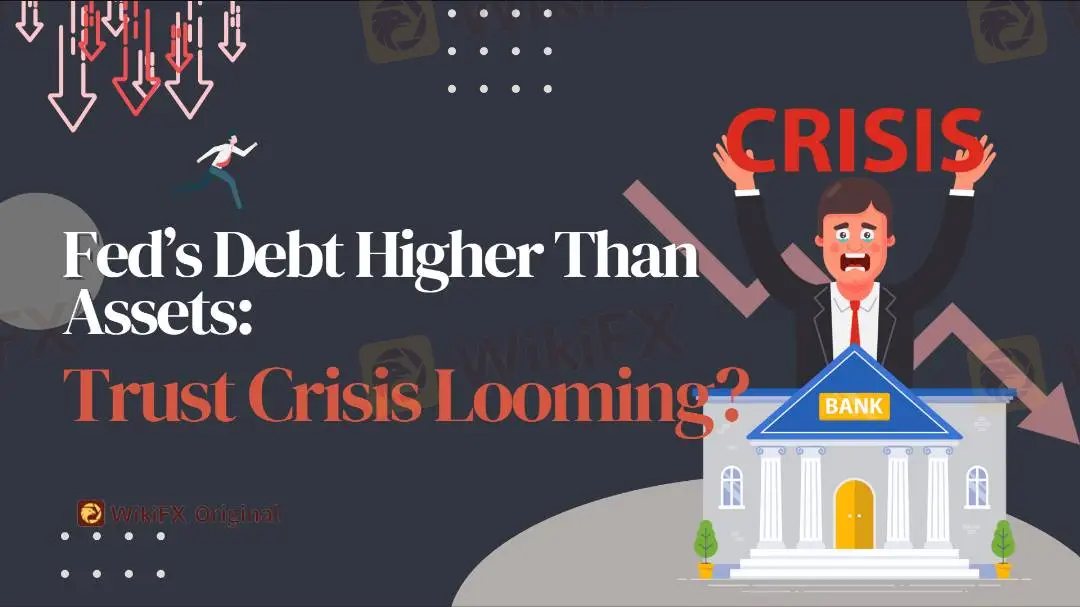简体中文
繁體中文
English
Pусский
日本語
ภาษาไทย
Tiếng Việt
Bahasa Indonesia
Español
हिन्दी
Filippiiniläinen
Français
Deutsch
Português
Türkçe
한국어
العربية
Fed’s Debt Higher Than Assets: Trust Crisis Looming?
Abstract:Since last year, the Federal Reserve (Fed) has implemented a series of interest rate hikes, resulting in increased interest costs for banks' reserve holdings. However, the returns on their assets have remained largely unchanged, leading to a situation where debt outweighs assets. This has raised concerns among market participants as any loss of confidence in the Fed could potentially cause significant disruptions.

According to a report from ChinesePress News, based on the H.4.1 balance sheet data as of the week ending April 27th, the indicator “Other Liabilities and Capital,” used to assess the net assets of the Federal Reserve, stood at negative $3.27 billion.

According to the accounting principles of the Federal Reserve, accumulated losses are recorded as “deferred assets” on the balance sheet under the asset column. Although this number is nominally an asset, it is essentially equivalent to accumulated losses, according to the Brookings Institution. As of the end of April, the Federal Reserve's deferred assets exceeded $52 billion, surpassing its paid-in capital and surplus, resulting in a negative net asset value.
The impact of the central bank's financial situation on the market remains to be seen. This appears to be the first time the Federal Reserve has encountered substantial negative assets, and the number of central banks in developed economies facing losses or negative net worth is unprecedented.
The report indicates that although this will not hinder the central bank's operations, there are two concerns in the market. One risk is the loss of confidence in the currency issued by the central bank. If panic intensifies, it may affect exchange rates.
The other risk is related to the central bank's independence, which could disrupt the market. When the Reserve Bank of Australia revealed a negative net worth in September last year, then-World Bank President Malpass stated that a central bank with negative book value would require even greater political support.

Disclaimer:
The views in this article only represent the author's personal views, and do not constitute investment advice on this platform. This platform does not guarantee the accuracy, completeness and timeliness of the information in the article, and will not be liable for any loss caused by the use of or reliance on the information in the article.
Read more

Close Up with WikiFX - A Closer Look at Taurex
With the rapid growth of the global multi-asset investment market, the disparities in the forex industry across different regions have become increasingly evident. As a forex broker information service platform operating in over 180 countries and regions, WikiFX is committed to helping investors in each region identify reliable brokers. Therefore, WikiFX launched a new series — Close Up with WikiFX, which offers in-depth interviews with local brokers. Leveraging WikiFXs robust big data system and industry insights, the series aims to help investors gain a deeper understanding of high-quality brokers.

Truth About Markets.com: 5 Hidden Risks Revealed
There are many brokers that offer too many promotions. Have you ever wondered why they do this? This Could be the story of Markets.com. Before you choose Markets.com, read about the hidden risks they never openly talk about.

5 Reasons: Microtrade Is a Red Alert
Is MicroTrade a scam or is it safe? This is a common question for many who are looking to invest or trade. Check out this article and you’ll see it is an investment scam

No License, No Security: CNMV Issues List of 10 Illegal Firms
Spain's financial watchdog, the National Securities Market Commission (Comisión Nacional del Mercado de Valores, CNMV), has issued warnings against 10 unlicensed forex brokers operating without proper authorization.
WikiFX Broker
Latest News
Alchemy Markets Review 2025: Key Facts and Insights
Largest Market Makers
Temasek's portfolio scales new peak even as divestments hit over 2-decade high
Exposing Trade Capital Limited - Siphoning Millions, Restricting Withdrawals, Charging Extra Fees
GMI Edge: A Closer Look at Its Licenses
How Do I Place a Stop-loss Order?
5 Serious Warnings About Mirrox! You Can’t Afford to Ignore
FXPRIMUS: 5 Things They Don’t Want You to Know
Manual vs. Automated Forex Trading: Which One Should You Choose?
Mining firms lift FTSE 100 to record high after Trump confirms 50% copper tariff
Currency Calculator


